
The Johnny Isakson and David P. Roe M.D. Veterans Health Care and Benefits Improvement Act of 2020” honors former Sen. Johnny Isakson, R-Ga., right, and just-retired Rep. Phil Roe, Tenn., left, seen here before a 2018 hearing. (Joe Gromelski/Stars and Stripes)
WASHINGTON – President Donald Trump signed a sweeping legislative package Tuesday that aims to help veterans facing a variety of challenges, including homelessness, access to care for women and Native Americans, toxic exposure and the coronavirus.
The legislation gained unanimous approval in Congress on Dec. 17 and was sent to the White House on Dec. 24. Tuesday was the final day for Trump to signal his support for the legislation. Presidents are given 10 days to sign bills before they become law without their signatures.
“Congress passed this critical end-of-year veterans’ package to enact changes and provide support for every corner of our veteran community,” said Sen. Jerry Moran, R-Kan., leader of the Senate Veterans’ Affairs Committee. “I applaud President Trump for signing this important legislation into law.”
The package is more than 340 pages long and includes dozens of measures – some of which have been in the works for nearly four years. It’s titled “The Johnny Isakson and David P. Roe M.D. Veterans Health Care and Benefits Improvement Act of 2020,” named for former Republican leaders of the House and Senate veterans’ affairs committees.
Much of the bill focuses on improving services for female veterans. It creates a dedicated Office of Women’s Health at the Department of Veterans Affairs, provides $20 million to retrofit VA hospitals with women’s health spaces and makes permanent a program to provide childcare at VA facilities, among other measures. It also mandates that every VA hospital hire a dedicated women’s health provider.
“For nearly four years, IAVA has been working hard to see this legislation finally cross the finish line, and we can now send a powerful message to women veterans that our nation respects their service and will not tolerate substandard care for them at the VA,” said Jeremy Butler, CEO of Iraq and Afghanistan Veterans of America.
In addition to improving health services for women, the bill aims to address a negative culture for women at VA facilities. It would require the VA to create an anti-harassment and anti-sexual assault policy and designate someone at each facility to receive reports of harassment. A working group will be created to help implement the policy.
The bill also aims to help veterans suffering from military sexual trauma. In 2018, the VA Office of Inspector General reported that the department wrongfully denied benefits to thousands of veterans who filed claims for military sexual trauma – rejection that potentially caused stress and psychological harm, the IG said. The legislative package requires teams who specialize in military sexual trauma to process those benefits claims. It also allows veterans who must be examined during the claims process to choose the sex of the medical provider examining them.
A few provisions address problems created by the coronavirus pandemic. One attempts to ease the federal grant process for organizations that aid homeless veterans. The organizations need the money to help veterans get into housing and renovate shelters to account for social distancing.
The bill also requires the country’s 162 state-run veterans’ homes to regularly report to the VA about their coronavirus cases and deaths. The homes, which are operated by states but overseen by the VA, currently do not report information about their coronavirus cases to the department. The VA is now required to publicly post the number of coronavirus cases and deaths at the homes before Feb. 4.
The legislative package also includes measures to aid student veterans. It increases legal protections for GI Bill benefits and places more scrutiny on schools with a history of taking advantage of beneficiaries. A key provision requires the VA to analyze whether schools facing legal or punitive actions from the government should be cut off from GI Bill money, a critical protection clause that has been lobbied for by advocates for more than a decade.
The package also made strides for Native American veterans by prohibiting the VA from charging them copayments and by creating an advisory committee that will advise the VA secretary about the unique challenges facing tribal veterans.
Wentling.nikki@stripes.com Twitter: @nikkiwentling